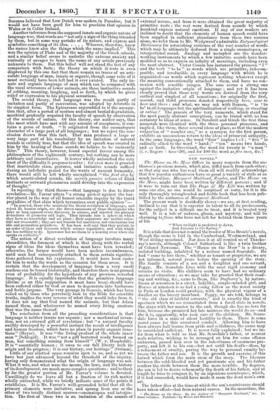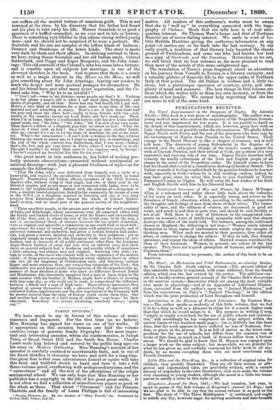NEW NOVELS. *
The House on the Moor differs in many respects from the au- thoress's previous novels, which also, differ much from each other; so that any one who has read them all will readily acknowledge that few popular authoresses have so great a variety of style or so much invention. Margaret Maitland, Zaydee, and The House on the Moor, might have been written by different persons ; and if it were to turn out that The Days of My Lffe was written by some one else, no one would be surprised or sorry, for it is the only thoroughly wrongheaded and feeble book that has been pub- lished by the authoress of Margaret Maitland. The present work is decidedly clever—we are, at first reading, inclined to say that it is superior in talent to all its predecessors, for the subject is a difficult one to treat, and it is treated very well. It is a tale of sadness, gloom, and mystery, and will be charming tothose who have not left far behind them those years of life
"When twilight is preferred to dawn, And Autumn to the Spring."
It is a tale that does not remind the reader of Miss Bronte's novels, though the scene is laid in the Cumberland, Westmoreland, and West Riding moorland. Nor does it at all remind. us of Thacke- ray's novels, although Colonel Sutherland. is like a twin brother of Colonel Newcome. The "House on the Moor" is a dreary, isolated building, inhabited by a recluse named Scarsdale. He had " come to live there," whether as tenant or proprietor, we are not informed, several years before the opening of the story. His family consists of a son and a daughter and one servant, Peggy. Mr. Scarsdale lives with the most rigid economy and returns no visits. His children seem to have had no ordinary means of education ; so we may take for granted that their read- ing and writing, &c., came to them, like Dogberry's, by nature. Susan at seventeen is a sweet, ladylike, simple-minded girl, and Horace at nineteen is as bad a young fellow as the worst society in Paris or London could produce, with the physical vigour of a dweller on the breezy moorland. Peggy, we are told, belongs to " the old class of faithful servants," and is exactly the kind of specimen which we see resuscitated from a fossil state in novels. She stays with her master to the end, though she has no love for him, because she promised her late mistress she would do so—and she it is, apparently, who took care of the children. Mr. Scars- dale lives in a state of silent hostility to them. There is some secret cause for this unnatural conduct. Allowing him to have been always half insane from pride and. selfishness, the cause may be considered sufficient. It is never fully explained ; but we in- fer from what is told us that Mr. Scarsdale's father, or nearest male relative, wishing to be revenged on him for some offence unknown, loan passed him over in the inheritance of enormous pro- perty, and left it to his son—but not until his death—thus, by a refinement of cruelty, paving the way to personal enmity be- tween the father and son. It is the growth and exercise of this hatred which form the main stem', of the story. The likenesa between the cold-blooded and yet passionate son and his father renders the strife between them the more terrible. By degrees, the son is led to desire vehemently the death of his father, and at length he tries to compass it, by an ingenious contrivance, which, if it had succeeded, would. have made it seem the dead man's own act.
The father dies at the time at which the son's contrivance should have taken effect—but from natural causes. In the meantime, the • The House on he Moor. By the Author of "Margaret Maitland," Jke. In three volumes. Publishc I by Hurst and Blackett. son suffers all the mental torture of conscious guilt. This is not lessened at the close, by his discovery that his father had found out his plan to take away his life. Horace Scarsdale is as good a specimen of a baffled scoundrel, as we ever met in tale or history. There is something very lifelike in this odious strong-willed young man—and we should not be surprised if he were a portrait. Mr. Scarsdale and his son are samples of the loftier kinds of badness ; Pouncet and Stenhonse of the lower kinds. The story is made very dark by them and their affairs. In striking contrast to them, we have young Susan Scarsdale and her old Indian uncle, Colonel Sutherland, and Peggy and Roger Musgrave, and Sir John Armi- tage. This old comrade of the Colonel's, who has come into a fortune, and is sensible upon all subjects but marriage, is one of the cleverest sketches in the book. And to prove that there is a comic as well as a tragic element in the House on the Moor, we will give something about Sir John Armitage, leaving our readers to mark the deeper and more poetical passages for themselves. He and his friend have met after many years' separation, and the Co- lonel asks him, "Why he is an invalid ? " "Can't tell—come to my fortune—some people say that's it. Nothing to do but please a man's self is what I call hard lines, Sutherland ; and duties of property, and all that. Never had any bad health till I got rich. Here's a nice kind of existence for a man come to my time of life—not married and not intending to marry. Here's a set of men that hunt half the year and shoot the other half—ought to keep friends with 'em—only society in the country, except my Lord Duke, and he's stuek-up. Then, when I'm at home, there's a confounded lawyer with his new leases and his seised rents, and "Sir John," "Sir John," till I'm sick of my own name. Then there's a fellow of a chaplain pegs into me about an heir. What the deuce do I want with an heir ? Says the estates go into another family after me—swears it's a sin to let the name of Armitage die out of the coun- try. What's the consequence ?—I can't look a woman in the face without thinking she wants to marry me, or I want to marry her, or something ; and the end of the whole concern was, Sutherland, that I ran away—bolted, that's the fact, and got your letter in Paris, where I was bored to death. Thought I couldn't do better than come to you express—and, by George ! I haven't enjoyed my breakfast like this for ten years!' " One great merit in this authoress is, her habit of making per- fectly accurate observations—presented without sentimental or satincal dressing—with just a pleasant liveliness of style—as for example the following— "Then. Sir John, when once delivered from himself, was a little of a hnmourist, and enjoyed the peculiarities of the society in which he found himself. Numberless old Indian officers, members of the Civil Service, families who, without being of that origin, had two or three sons in our Oriental empire, and people more or less connected with India, were to be found in the neighbourhood. Indeed, with the mixture of a clergyman or two, a resident landed proprietor, linked to the community by means of a son in the ]3.N.I., or a daughter married in Calcutta, and one or two stray lawyers from Edinburgh—this formed the whole of Colonel Suther- land's society, and no small part of the general society of the neighbour- hood.
" These excellent people, to the greater part of whom the world consisted of India and Edinburgh, whose associations were all connected either with the kindly and limited circle of home, or with the bizarre and extraordinary life of the East, and to whom the rest of the world came in by the way, a sort of unconsidered blank of distance between the two points of interest, were as original and agreeable a community as one could wish to meet with; experience, for years of travel, of intercourse with primitive people, and of universal command and authority, had given a certain decision and autho- rity, had given a certain decision and authority to their judgment ; yet so singularly simple in respect to this European world and its centres of civi- lization, and so innocent of all public sentiment other than the dominant Anglo-Saxon instinct of sway and rule over an inferior race, that their views on general subjects had a freshness and novelty which, if sometimes a little amusing, was always racy and original. Knowing very little, ex- cept in words, of the races who contest with us the supremacy of the modern world ; of those powers so equally balanced whose slightest move on either side sets all the kingdoms of Christendom astir, and threatens contests bigger and more ominous than any conquering campaign of the East ; this community was good-humouredly contemptuous of the incomprehensible ig- norance of those dwellers at home who knew no difference between Tamul and Hindostani, who innocently imagined that a man at Agra, being in the same country with his brother at Madras, might have a chance of meeting with him some day, or who could not be made to comprehend the difference between a Dhobi and a man of high caste. These strange ig,norances they laughed at among themselves with a pleasant feeling of superiority, and contested Indian appointments and the new regulations of the Company with far greater interest than the state of Europe could excite them into. One and another had charge of a little troop of children, sent home' for their education. Somebody was always returning, somebody always going out."



























 Previous page
Previous page